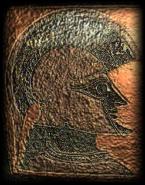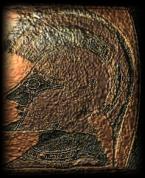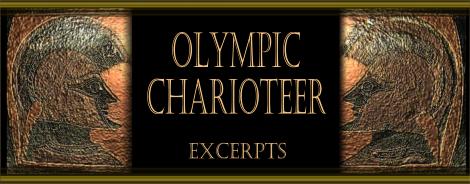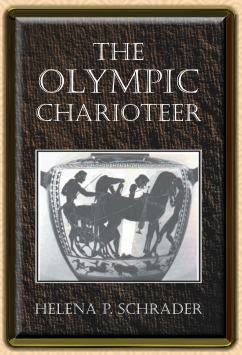
HOME
CONSTITUTION
ECONOMY
EDUCATION
ETHOS
FOREIGN POLICY
WOMEN
MARRIAGE
SEXUALITY
ART
LEONIDAS
ESSAYS
NOVELS
SOURCES
SCREEN SAVER
GUEST BOOK
AUTHOR BIO
SPARTA BLOG
AUTHOR WEBSITE
SPARTAN THEMED
T-SHIRTS, TOTES
& MORE
CONSTITUTION
ECONOMY
EDUCATION
ETHOS
FOREIGN POLICY
WOMEN
MARRIAGE
SEXUALITY
ART
LEONIDAS
ESSAYS
NOVELS
SOURCES
SCREEN SAVER
GUEST BOOK
AUTHOR BIO
SPARTA BLOG
AUTHOR WEBSITE
SPARTAN THEMED
T-SHIRTS, TOTES
& MORE


Two cities at war –
Two men
with Olympic ambitions -
And one
slave – the finest charioteer in Greece
THE OLYMPIC CHARIOTEER:
EXCERPTS
He had grey eyes under dark brows in a face that was fox-like in its sharpness. Antyllus was reminded of the foreman's depiction of the slave as "sly." More startling, he had an ugly scar running from two inches above his left brow to the inside corner of his right eye. It was the kind of scar a man got from brawling.
Antyllus thought he saw the lips move, and he leaned over solicitously, expecting a thank-you or a request for water. He held his ear close to the bleeding lips, and the slave whispered to him in a rasping, pained voice: "Don't think I'm grateful."
Antyllus drew back offended, and then he threw back his head and laughed at himself. Hadn't he interceded because he had seen a death wish in the slave's eyes? How foolish then to expect gratitude for saving the slave's life.
He went down on his heels beside the slave and laid his manicured hand on his dust-caked, bony shoulder, "I understand. But you'll get over it." Then he ordered one of the drivers to keep an eye on his team - and his new slave, and went in search of the overseer.
At the end of the training session, Lysandridas was deeply depressed by the thought that Thessalos would go to Olympia. If he won, it would be because of the horses, and if he lost because of his driving. Much depended on what driver Antyllus found. His team wasn't as strong as this one, but it was very willing and all four of the horses would break their hearts trying - for the right driver….
Thessalos pulled up grinning and wiping sweat from his forehead with the back of his arm. "Well? What do you think of them?"
"They're the best team of horses I've ever seen," Lysandridas told him honestly.
"So why do you look so glum? You can't want Tegea or Corinth to win?"
"No. I just wish I were going to drive them at Olympia."
Thessalos laughed, taken aback by the honesty, but then he said seriously, "if something happens to me, you can be sure my granddad will give you the reins."
"Now, I will tell you why I oppose this war with Tegea and why I am willing to risk an open confrontation with the Kings, and even an internal conflict that could shake the foundations of our City."
Teleklos looked up sharply.
"It is because Sparta can only lose. What I mean is that even if we win - especially if we win - we lose."
"I don't understand."
Chilon laughed. "What I'm saying is that if we lose, we have sacrificed more young lives for nothing, other families - or even the same families - will be forced to pay huge ransom sums they can ill afford. Our reputation throughout Greece will decline. The Argives certainly and very likely the Messenians will be encouraged to challenge us. Argos could well attack and the Messenians revolt in a co-ordinated effort causing us to fight on two fronts. If Argos, Messenia and Tegea join forces, we could be crushed completely."
Teleklos was horrified. "You seriously think Tegea is that powerful?"
"No. I don't. I simply don't think any city should go to war without considering the consequences of defeat. But the far more likely scenario is that we will conquer Tegea. And then? Consider what we will have done. We will have conquered yet another free-minded Hellenic people that will oppose us at least as vehemently as the Messenians." Chilon let this sink in and then continued. "What did we gain by the conquest of Messenia? Our territory doubled. Our natural produce, trade and material prosperity in every respect increased. And our security?
How do you keep twice as much territory and twice as many helots under control with the same number of citizens? More than twice the number of helots," Chilon corrected himself. "Consider the fact that in Lacedaemon we have Perioikoi who support us and share the burden of our defence. In Messenia we are an occupation power. In Tegea it would be no different. How do you think we can spread a citizen-body of 8,000 to 9,000 men across an ever greater territory? Isn't it bad enough that we constantly have to fear a Messenian revolt? Do we want to live in fear of a Tegean revolt as well?"
Teleklos shook his head sadly. It would be a nightmare.
Chilon continued, "A city - no less than an individual - has to know the limits of its power. Know thyself is the most important lesson any boy - or man - can learn. Sparta cannot expand without endangering its own ethos and integrity. That is why I believe a victory in Tegea would be even worse than a defeat."
They came stumbling out of their beds bewildered while in the courtyard Philip just stood waiting. "Cobon! Melissos! Strip him and tie him to the pillory! I'll show you what insolence will earn you. GO ON! Tie him to the pillory!"
Cobon and Melissos, though dazed, each grabbed one of Philip's arms, and led him to the pillory in the corner of the courtyard. The pillory was almost obscured from view by a chestnut tree that had grown up in the last decades.
They pulled his chiton down, to expose his back, faced him to the pillory and would have fit his hands into the rusting hand-cuffs that hung from it, but suddenly he thrust them aside so violently and unexpectedly, that he nearly knocked Cobon over and was free of them. He spun around to face Antyllus, screaming loud enough to wake the dead; "I'm not a beast!" He made no move to run away. "You don't chain me! I can stand!" He faced the pillory again, and gripped it just above his head with both hands, his bent arms at right-angles to his body so his shoulders were taught and offered to the whip like a sacrifice. The scars of other floggings stood out sharply on his naked back.
In that instant, Antyllus felt the first qualm of guilt. But he had made too much of a scene to stop now. He reminded himself of the smile on Philip's face as he - in blatant disobedience - let the horses gallop toward the curve. He reminded himself that they would both be dead - or at least seriously injured - if he hadn't crouched down and managed to weight the outside wheel enough to prevent the chariot from over-turning. He reminded himself of Philip's smile of triumph as he saw he had frightened his master, and it merged with Dion's red and sweated face as he rushed from the house in the middle of the night - Dion who was now standing and gaping with open mouth as he cradled his splinted arm. Antyllus brought the whip down on Philip's exposed back with all the strength he had in him.
Philip's back - frail and bony - flinched, but not a sound came from the slave. Antyllus felt humiliated. Was he so weak and old that he couldn't even hurt the skinny, little barbarian? He gathered his strength again, and moved in closer. He brought the whip down and the sound of it made him wince, but there was nothing audible from Philip.
He started beating faster and more furiously. The skin finally burst. Blood started to seep up out of the crevices torn in the flesh. It collected and ran down the gullies of flesh like rain in the furrows of a field. From behind him, Antyllus could hear the gasping and mutterings of the others.
Suddenly he saw himself from the outside. A brutal man, no better than the foreman at the quarries, or the contemptible Polycritus of Corinth. He too was flaying a slave who was neither defending himself nor trying to evade the punishment. In horror Antyllus flung the whip away as if it was burning him and rushed for the house, shouting to cover his own humiliation. "Just remember you could be next, Dion!" It felt good to say that. Dion deserved a flogging! So why had he been beating Philip? What was it about the young slave that apparently drove his masters to abuse him?
Kyniska and Leonis' aunt bathed the bride in water scented with crushed rosemary. They washed her hair and then cut and styled it with great care. Knowing how much Lysandridas liked her long hair, Leonis found it hard to part with it - and yet this was the symbol of her new status, which she was proud to show the rest of the city after so long.
It was late afternoon by now and the streets and courtyards of the townhouses were in shadow. From the distance came the sound of pipes wailing. "I hadn't realised it was that late!" Kyniska exclaimed surprised.
Leonis and her Aunt stopped and listened, and Leonis knew even before her Aunt voiced it: "That's not the call to dinner. That's alarm!"
They looked at one another, and then rushed down the stairs, across the courtyard and out into the street. In every doorway women and small children clustered, while men in various states of arming themselves clattered out and past them. They ran, pulling on their caps and helmets as they went, their shields over their backs clacking against their swords with every stride. A unit of youths from the agoge plunged down the street in a pack, jabbering and shouting to one another. A senior commander, in the distinctive cross-crested helmet of Spartan officers, galloped by with his scarlet cloak streaming out behind him.
"You don't think that the Tegeans could have attacked the city?" Kyniska asked in distress, and then without waiting for an answer, declared: "I must get back to my babies!" Forgetting her shawl, she rushed down the street in the opposite direction of the last men still responding to the howling of the pipes.
Then the street was silent and still. The women returned inside to wait.
"We were given a mandate to secure the freedom of the captive women at almost any price, provided they had not been violated."
"And have they been?" Antyllus asked with raised eyebrows.
"No. We were able to visit them last night and speak to them in private. Harmatides surprises me. For a tyrant he seems remarkably - humane."
"Don't under-estimate him. He is capable of cold-blooded murder. But he is losing control of the mob."
"What use is a tyrant who does not control the mob?"
"No use," Antyllus agreed.
There was a moment of silence. Then Chilon remarked, "Odd. Then why didn't he sacrifice the captives for his popularity? It would have been so easy."
"One of the captives is the widowed sister of our Agiad King Anaxandridas," Chilon told Antyllus.
Antyllus caught his breath, and then asked slowly, "And what is the Lacedaemonian government prepared to offer for her safe return?"
"A non-aggression pact," even as Chilon said it, he knew it wasn't enough. "Is there anyone here who wants it?"
Reader View Review
ORDERyour copy today!
Under "SOURCES" you will find the research materials I used in this book and website. These materials are also additional recommendations of both fiction and non-fiction books, including selected ancient and modern sources for your own research and/or reading pleasure.
ONLINE TRANSLATOR AND DICTIONARY
This site is best viewed with IE6 (or higher), a browser window sized at 1024 pixels wide or wider, and with a monitor display resolution set at 1280x1024.
PRIVACY I COPYRIGHT I CITING I SITE MAP
Text varies on this site between British and American English spelling. Most research was done in Europe and compiled for British English publications. Interviews and reviews reflect both American and British English as Helena Schrader is a leading authority on this subject in the US and Europe.
Contents of this web site are copyrighted. ©1993-2012 Helena P. Schrader unless otherwise noted. If you would like to use the material of this site, please contact Helena Schrader. If you experience any problems with this site, please contact the web mistress.
Last updated July 12,
2010
Site design and maintenance Crystal Cloud Graphics
Web Hosting Elysium Gates.com
Site design and maintenance Crystal Cloud Graphics
Web Hosting Elysium Gates.com




